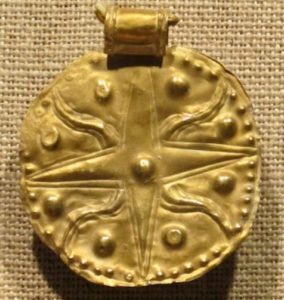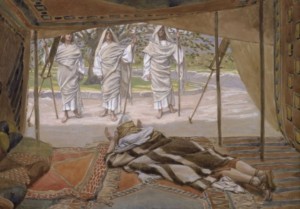In the first of this week’s double parasha, Matot, we read about the tribute and offerings that the Israelite warriors brought to Moses and Elazar the Kohen Gadol following their wars of conquest. Among the jewellery we find “armlets, bracelets, rings, earrings, and pendants” (Numbers 31:50). Although the final word in this list, khumaz (כומז), is typically translated as “pendant”, its meaning is far more mysterious. Rashi says here that the khumaz was apparently a pendant in the shape of a womb, and by offering up these ornaments, the Israelites were atoning for the sexual sin previously committed with the Midianites.

Canaanite Jewellery from the Late Bronze Age, c. 13th century BCE (Credit: factsanddetails.com)
Long before this sin, in Exodus 35:22, we already saw how the Israelites donated their own jewellery for the construction of the Mishkan, and the khumaz appears there also as something offered by the righteous Israelite women. Rashi’s comment there is different, citing the Talmud (Shabbat 64a) that khumaz stands for kan makom zimah (כָּאן מְקוֹם זִמָּה), meaning that this jewellery was something placed on the reproductive organ and was used for “lewdness”! The shocking implication seems to be that this was a piercing in the nether regions.
Interestingly, the Talmud here also presents an opinion that ‘agil (עגיל), typically translated as an “earring”, was actually worn on the breasts, perhaps as a nipple ring, or a golden breastplate of some sort designed to accentuate a woman’s features for lewd purposes. The Talmud concludes the passage with Rav Sheshet saying that the Torah lists exposed ornaments (like bracelets and rings) with concealed ones (like the ‘agil and khumaz) to teach you that there is really no difference: a man that ogles at a woman’s exposed features and ornaments (even just a pinky finger!) is equated with one who ogles at her concealed features and is just as wicked.
The Riva (Rabbi Isaac ben Asher haLevi, c. 11th century), a disciple of Rashi and one of the Tosafists, asks how it is possible that a piercing or ornament of lewdness could be donated for a holy purpose? Similar objections were understandably shared by other commentators. This is why the Ibn Ezra says (on Exodus 35:22) the khumaz must simply be a bracelet for the upper arm. Another possibility was that it was indeed placed over the reproductive organ as the Talmud states, though not for lewdness, but for chastity. Perhaps the khumaz was like a “chastity belt” purportedly used in the Middle Ages to ensure a woman remains a virgin and/or to protect her from sexual harassment. The reality, however, is that there is no physical evidence that such belts ever existed, nor can anyone explain how they might have been comfortably worn or how they would have been kept locked in place without the option of easily removing them. Scholars relegate chastity belts to the realm of myth.
The best explanation is probably that the Israelite women only had those types of lewd ornaments and pieces of jewellery because they were taken from the Egyptians. Recall that the Israelites received gifts and riches from the Egyptians as they left (Exodus 12:35-36). So, it is these pagan ornaments that they repurposed for use in the holy Mishkan. (We might conclude that, in so doing, they were able to affect a tikkun, a spiritual rectification.) The Israelite women themselves probably never wore them. And if they did, it begs the question: what is actually permitted halakhically today when it comes to bodily piercings?
The first piercing that comes to mind is earrings, which we know must be fine. Then come nose rings, which we might assume are not fine. Yet, the reality in ancient Israel may very well have been the opposite. We read, for instance, how Eliezer brought Rebecca a nose ring as a gift (Genesis 24:22 and 47). For those who might argue that this was before the giving of the Torah, and since then nose rings are no longer permissible, the Talmud (Sotah 7b) states that a sotah who was suspected of being an adulteress had to remove her nose ring, meaning they were common among Israelite women at least up to the Talmudic era.
The Talmud there mentions three specific types of ornaments: finger rings, nose rings, and necklaces or “chokers” worn close around the neck. Note how earrings are strangely not mentioned, suggesting that nose rings were more popular among Israelite women at the time. Indeed, the Torah suggests that earrings may have been associated with slavery, as we read how one who wished to be a permanent slave needed to have their ear punctured with an awl (Exodus 21:6). There is a big question if the slave actually had to wear an earring afterwards, or if he only required to have his ear punctured once symbolically. Most likely, he did have to wear an earring to identify him as a permanent slave, and the earring may have even identified to whom he belonged. The Talmud (Kiddushin 21b) has an opinion that the puncturing was done specifically in the upper ear, so perhaps there is a difference between an earring on the earlobe for beauty, versus an earing on the upper ear cartilage to indicate slavery.
The 24 Ornaments of a Jewish Bride
As explored in the past, the Torah gives us 24 ornaments that an Israelite bride would be adorned with in ancient times. The prophet Isaiah lists them in the third chapter of his book, and they are:
- anklets [‘achasim] עֲכָסִ֛ים
- ribbons (or headbands) [shvisim] שְּׁבִיסִ֖ים
- crescents [saharonim] שַּׂהֲרֹנִֽים
- pendants (or earrings) [netifot] נְּטִפ֥וֹת
- bracelets [sheyrot] שֵּׁיר֖וֹת
- veils [ra’alot] רְעָלֽוֹת
- headdresses [pe’erim] פְּאֵרִ֤ים
- armlets [tza’adot] צְּעָדוֹת֙
- sashes [kishurim] קִּשֻּׁרִ֔ים
- corselettes (or talismans) [batei hanefesh] בָתֵּ֥י הַנֶּ֖פֶשׁ
- amulets [lehashim] לְּחָשִֽׁים
- rings [taba’ot] טַּבָּע֖וֹת
- nose-rings [nizmei ha’af] נִזְמֵ֥י הָאָֽף
- aprons (or festive robes) [mahalatzot] מַּֽחֲלָצוֹת֙
- shawls [ma’atafot] מַּ֣עֲטָפ֔וֹת
- hair-coverings [mitpachot] מִּטְפָּח֖וֹת
- girdles (or purses) [charitim] חֲרִיטִֽים
- robes (or gowns) [gilyonim] גִּלְיֹנִים֙
- fine linen (or linen vests) [sadinim] סְּדִינִ֔ים
- headscarves (or kerchiefs) [tzenifot] צְּנִיפ֖וֹת
- mantles (or capes) [redimim] רְדִידִֽים
- perfume [bosem] בֹּ֜שֶׂם
- belt (or apron) [chagorah] חֲגוֹרָ֤ה
- hair curls or braids [petigil] פְּתִיגִ֖יל
In this list, we see no mention of the ‘agil or khumaz, lending further evidence that these really were inappropriate piercings. We do have netifot, literally “drops”, which some interpret to mean earrings that are like droplets hanging from the earlobes. The only other piercing mentioned is, once again, the nose ring. The term used is nezem af, with the second word seemingly superfluous. If nezem already means a “nose ring” then why add af, “nose”?
This dilemma might be solved by looking at the Golden Calf incident. Recall that Aaron had told the men to “take off the gold rings that are on the ears of your wives…” (Exodus 32:2) The term for “gold rings” is nizmei hazahav (נִזְמֵ֣י הַזָּהָ֔ב), but Aaron says to remove them off of their ears! So, a nezem might be referring to any piercing, whether on the nose, ears, or otherwise. Finally, in Ezekiel 16:11 (which parallels Isaiah 3, above) we read that God bedecked the Jewish people with “a ring in your nose, and earrings in your ears, and a splendid tiara on your head.” Here, a nezem is clearly a nose ring and ‘agilim are undoubtedly earrings. So, a Jewish women could sport a modest nose ring and earrings, but other piercings are unlikely to be kosher.
On the whole, there are three major things to consider regarding piercings: first is tzniut, that the piercing should be elegant and modest. Second is darkei Emori, the prohibition of imitating pagan practices. If the piercing is a type that is widely acceptable and universal, like earrings or nose rings, then it is most likely okay, while if it is clearly associated with pagan or gentile practices, then it is not okay. Lastly, there is the issue of beged ishah, that men cannot adorn themselves in the manner of women. Since piercings are generally considered a woman’s form of adornment, they would be entirely prohibited for Jewish men. This is all the more important today, when secular society seeks to completely blur the gender gaps, so we should be all the more punctilious in clearly defining and differentiating between men and women.
Shabbat Shalom!

